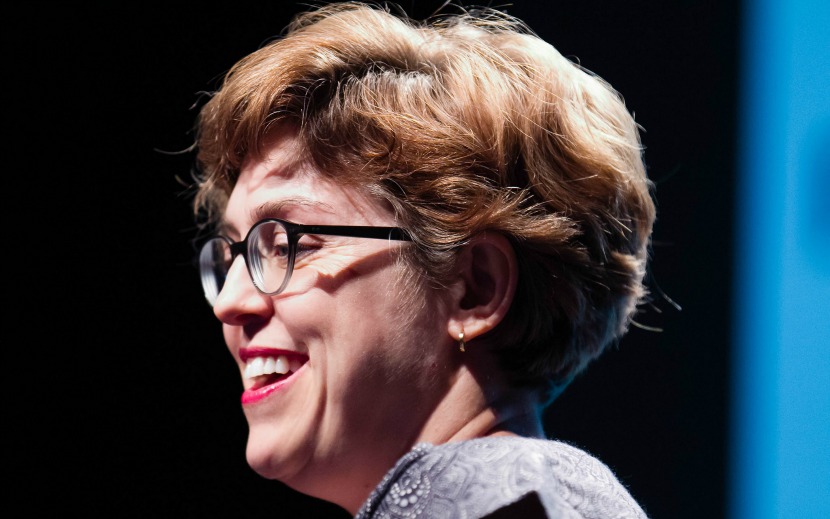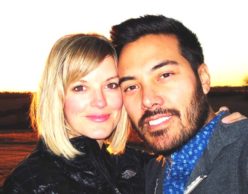Erin McKean On English, Our Shared National Delusion

Erin McKean is a linguist, entrepreneur, dictionary editor, author and the founder of Reverb, which publishes the online dictionary Wordnik. She is basically one of the world’s foremost experts of the ever-evolving English language. Erin sat down with us at PopTech to talk about code switching, otaku, and what it means when something is illin’. Hint: Lots of things.
We talk a lot about guilt in our community, and the thing that most people feel guilty about is losing language. Why?
Language is so core to identity. Language is how you connect with people instantly. And if you lose the language, then you lose those points of connection with that language speaking community. It can be broader than a faith community, even. There’s a joke about a language as a dialect with an army and a navy. Where we define the borders of language can be coterminous with geopolitical borders. We get waves of language-triggered xenophobia in the U.S. all the time. German speakers in the U.S. during World War I stopped speaking German. My husband’s grandfather was named Franz Josef. Around the time of WWI he started going by Pat.
Does English absorb other languages, or wipe them out?
English tends to be super greedy for other people’s words. When there are two cultures meeting, English tends to be the big amoeba and soak up the words of the other. One of the words of the day for Wordnik recently was “conjunto,” which is Mexican border music. American English just stole that word because Americans like that thing, so now it’s part of English. In the United States, where there’s a lot of pressure to assimilate, Americans can be more welcoming of the words than they are of people.

Why is English greedier than other languages?
There are syntactic reasons why English can be greedy, because there isn’t a complicated grammatical system. English also has a history as a colonizing language. So English speakers got used to going someplace and taking over and taking the words. We got words like “pajama” from India.
There are so many kinds of English. British English. American. Singaporean. Is there a “right” one?
Americans tend to think of British English as purer, better, or more authentic. To American ears, British English sounds smarter. But no.
If I want someone to like me but I don’t really care how smart they think I am, I’ll sound more Southern.
How fluid is American English? How rapidly does it change?
It’s hard to say because we don’t have a baseline. People code switch a lot – even native English speakers code switch between a home version of their speech and a standard version of their speech. I’m from North Carolina and I don’t have much of a Southern accent anymore, but I know people generally perceive people with Southern accents to be more likable and also slightly dumber. So occasionally, if it’s to my advantage to sound more Southern, like I want someone to like me but I don’t really care how smart they think I am, I’ll sound more Southern. People code switch to highlight what they want in a certain community.
Do you feel that sense of loss when you’re code switching? I definitely do it — but I’m very aware that I’m doing it and I feel weird and inauthentic.
As I get older and more entrenched in my identity, I am more comfortable with being more Southern on a regular basis. I say “y’all.” I say “sir” and “ma’am.” My parents were in the military service, so they moved around a lot, and we did too. Code switching is just something we did our whole lives.
If English is so malleable, why is there so much fear about our “national language”?
People worry about being excluded. And this fear can be so overpowering that it operates at a level unjustified by the actual amount of danger. There’s no level of possible demographic change that could make the United States a majority Spanish–speaking country, at least not in anyone’s lifetime who is alive right now. That’s just not possible.
What are the most interesting words being adopted into American English right now?
A word that we stole from Japanese is “otaku,” which is like a super nerd. Like someone who is charmingly obsessed. There’s a British English equivalent that we didn’t adopt, which is “anorak.”
I thought that was a jacket.
It is! Obsessive train watchers and bird watchers wear these jackets because they’re outside all the time. So by extension anorak means a super nerdy hobbyist. But most words that get adopted into American English are food and music words. Those are always on the cutting edge because it’s cool and hip in America to like exotic food and music. Same with fashion. Other countries tend to take American computing and technical terms.
The Korean word for “mobile phone” is “handphone.”
Hand phone! In German they call it a “handy.”
English is the shared delusion of everybody who says they speak English.
If English is constantly changing, how do you define English?
English is the shared delusion of everybody who says they speak English. If I say something is English, and you agree with me, and we both identify as English speakers, then it’s English. It is a faith-based system. And that’s why if a significant number of people use something as a word, it’s a word. It might not be standard English, and it might not be educated English, but it’s English, because two English speakers agree that they can understand each other.
I loved when Will Shortz had “illin” in the crossword and everybody got all worked up.
All sides were correct in that argument, too. The word for words which have very different meanings is polysemy. Sometimes they vary drastically. “Girl” used to mean young person of any gender. “Deer” used to be a young animal of any kind. “She” is the youngest pronoun in English. It was the last pronoun to be added to our repertoire. Pronouns are the slowest to adapt.
So as identities change, language is actually the slowest to reflect that? Like in the trans community.
Exactly. It’s a wave. Language change starts in a small community and then as that community because better represented or more visible, then it seeps into the mainstream.
How many languages do you speak?
I just speak English. I have enough German to apologize for not speaking better German. I spent a fair amount of time in Denmark and I tried so hard to learn how to say a couple normal things in Danish, but …
Danish is hard.
Danish is so hard! I would say something and it was like a three-year-old coming in wearing a tie and carrying a brief case and giving a speech. It was an adorable level of effort, but Danes would just pat you on the head like, that’s okay, I speak English.
Ha! I was raised to believe it was a dream to speak perfect American English. It’s very different for me as a mom. But my parents were like, we want you to speak the best English possible.
Because it’s a significant economic advantage. And once you have a place of economic privilege, then you can have the luxury of having your children be bilingual. Also, now we understand that there is an economic advantage to being bilingual, whereas in the 70s or 80s, we didn’t know that. We believed the advantage came from being an excellent English speaker.
I can’t wait until we get to a place where we can also believe in the soulful advantages of being bilingual.
Yes. I do wish that I were fluent in something else.
But you’re so super fluent in English!
I doubled down on English for sure.





